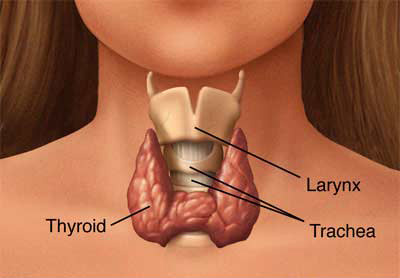
Thyroid: The butterfly shaped gland over the Adam’s apple of the neck.
Hypothyroidism: When the thyroid is underactive.
Hyperthyroidism: When the thyroid is overactive.
Antigen: Any substance that causes your immune system to produce antibodies against it.
Antibody: An antibody is an immune protein produced by the body’s immune system when it detects harmful substances, called antigens.
Autoimmune Disorder: A condition that occurs when the immune system mistakenly attacks and destroys healthy body tissue. Hashimoto’s thyroid is an example.
According to the American Association of Endocrinologists, more than 27 million Americans suffer from thyroid dysfunction and an estimated half or 13.5 million go undiagnosed. Of the detected cases of hypothyroidism, more than half are due to an autoimmune disorder called Hashimoto’s disease; where the immune system attacks and destroys tissue of the thyroid gland. All too often, the question of why the thyroid gland quit working never comes up.
Thyroid replacement hormones are a first line defense for many doctors, prescribed with the promise of wiping out a number of symptoms with one tiny pill. But taking that approach is turning a blind eye to what caused the thyroid gland to become depressed in the first place. A number of conditions such as: irregular immune function, poor blood sugar metabolism, gut infections, adrenal gland problems and hormonal imbalances can all significantly depress thyroid function. While prescription thyroid hormones might bring thyroid levels in the blood into a normal range, the hormone replacement doesn’t address what caused the thyroid to flounder in the first place. The drugs may make some people feel better, but for many others the relief is short lived, if it occurs at all…even when they have normal blood tests.
The better course may be to investigate and address the conditions that caused the thyroid gland to slow down in the first place. Be prepared though: the conditions creating they hypothyroid symptoms may likely call for lifestyle changes and lasting nutritional support. If the check engine light illuminates on your car’s dash, which is the smarter course: to investigate the engine or remove/mask the light? Failing to ask what the thyroid symptoms are trying to communicate and prescribing levothyroxine sodium (Synthroid, Armour, or Levoxyl) is like simply removing or masking the light.
While the concept that environmental factors, in particular infectious agents, may cause severe thyroid disorders has been in medical literature since the 1940’s; many clinicians rely on antibody levels and elevations in thyroid stimulating hormone (TSH) while giving little attention to factors involved in thyroid autoimmunity (ex: Hashimoto’s). Posing the question: “Why does the human body react to its own antigens, resulting in the production of potentially harmful autoantibodies?” Then investigating the likely underlying factors driving autoimmunity and addressing them can open the door to greater overall health along with relief of symptoms.
Many patients begin to enjoy not only relief of symptoms, but also true health when addressing the underlying causes of hypothyroidism.
Why is the thyroid so important? If your cold the thyroid steps on the gas to create more heat. If you’ve got a virus, the thyroid revs up the engine of your immune system. The most important thing to remember about the thyroid is that it is highly sensitive to the slightest alterations in the body.
Common symptoms of low thyroid function:
- Fatigue
- Weight gain despite adhering to a low calorie diet
- Depression
- Constipation
- Hypersensitivity to cold weather
- Poor circulation or numbness in the hands and feet
- Muscle cramps while at rest
- Increased susceptibility to colds and other viral or bacterial infections and difficulty recovering from them
- Slow wound healing
- Excessive amounts of sleep to function properly
- Chronic digestive problems, such as lack of stomach acid (hypochlorhydria)
- Itchy, dry skin
- Dry or brittle hair
- Hair falls out easy
- Dry Skin
- Low auxiliary (body-heat) temperature
- Edema, especially facial swelling
- Loss of outermost portion of eyebrows.
Signs that can indicate Autoimmune Hashimoto’s Disease:
- Heart Palpitations
- Inward trembling
- Increased pulse rate, even at rest
- Feelings of nervousness and emotional distress
- Insomnia
- Night sweats
- Difficulty gaining weight
Why is good thyroid function so important? Many of the below body functions can become impaired due to faulty thyroid function.
- Bone Metabolism
- Gastrointestinal Function
- Male Reproductive Health
- Gallbladder & Liver Function
- Growth Hormones
- Fat Burning
- Insulin and Glucose Metabolism
- Cholesterol & Triglyceride Regulation
- Brain Chemistry
- Estrogen Metabolism
- Adrenal Hormone Metabolism
- Liver Detoxification
- Stomach Acid Production
- Protein Metabolism
- Body Heat & Hot Flashes
- Progesterone Production & Metabolism
- Anemia
- Cardiac (Heart) Health
As you can see the thyroid gland controls many important body functions. Symptoms of thyroid dysfunction are easily confused with other conditions or explained away as signs of “just getting older.” If you think you have symptoms of a thyroid problem or other hormonal imbalance call today 407-629-5333 for an evaluation.
More articles for thyroid disorders
*If your problem is found to be beyond nutritional and lifestyle modification then we will refer you to your primary care physician for co-management. If you are currently taking a prescription thyroid medication and our nutritional program improves your condition and you require less medication we will refer you back to the prescribing doctor to discuss any dose modification.
**Reference: “Why do I still have thyroid symptoms? When my lab tests are normal” Datis Kharrazian, DHSc, DC, MS, MNeuroSci, FAACP, DACBN, CIBAK, CNS. ©2010

